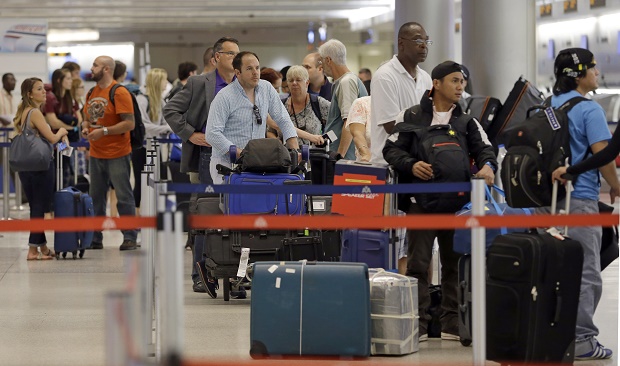Don’t let airlines lose your suitcase this Thanksgiving

In this May 22, 2015 file photo, travelers wait in line to check in their luggage at Miami International Airport in Miami. Heading into winter, fliers should take extra precautions with their checked luggage, December and January are traditionally the worst months for lost bags. AP Photo
NEW YORK, United States—Heading into winter, fliers should take extra precautions with their checked luggage—December and January are traditionally the worst months for lost bags.
To avoid problems, arrive at the airport early enough to let your bag get to the plane, and print out a copy of your itinerary from the airline’s website and stick it inside just in case all the tags get ripped off.
In the U.S. during the first nine months of this year, 3.3 bags for every 1,000 passengers didn’t make it to their destination on time, according to the Bureau of Transportation Statistics. That’s not great if you are one of those people whose bag is delayed or lost. But consider this: during the 2007 peak in air travel, airlines were mishandling more than twice as many suitcases—7.2 bags per 1,000 passengers.
Globally, the baggage-mishandling rate has fallen 61 percent from its peak in 2007, according to SITA, an aviation communications and technology provider. That has saved the industry $18 billion.
The vast majority of bags—80 percent—aren’t lost but just delayed, according to SITA. And it takes about a day and a half to reunite passengers with their bags. Another 14 percent are damaged or have their contents reported stolen. And nearly 6 percent of bags are lost or stolen completely.
December and January tend to be the worst months because there are a lot of infrequent travelers checking multiple bags, and a few snowstorms can add to delays and suitcases that miss connections.
The overall improvements to baggage handling come after carriers spent millions of dollars to upgrade their systems.
Tug drivers now get real-time updates of gate changes so they can change their path and ensure that bags make their connection. Scanners allow bags to be tracked throughout the system, preventing a suitcase bound for Chicago from being loaded onto a plane to Detroit. Gate agents have printers to help tag bags that are checked at the last minute because of full overhead bins. And, overall, fewer bags are being checked because of bag fees.
“We continue to invest in technology and in processes so we understand where bags are at all times, and we can manage the failure points,” says Bill Lentsch, senior vice president for airport customer service and cargo operations at Delta Air Lines.
Airlines are also starting to empower passengers—or at least keep them better informed.
Delta was the first airline to allow fliers to track their own checked luggage, first on the airline’s website in 2011 and then on its mobile app in 2012. Bag tags are scanned when the suitcase is dropped off, loaded onto a plane, loaded onto a connecting flight and then again before being placed on the carousel at baggage claim. Passengers can see all those scans.
American Airlines followed suit in August, allowing passengers to see when a suitcase was loaded or unloaded from a plane. Right now, it is only available on the airline’s website but will eventually be part of the mobile app.
Sitting on a plane ready for takeoff and knowing that your suitcase isn’t in the hold below might be frustrating. But airlines say they would rather have passengers know it then and talk immediately to a baggage representative, once on the ground, instead of standing at the carousel waiting for a suitcase that isn’t there.
If your bag is late, you might be able to get some bonus frequent flier miles or even a voucher toward a future flight.
Since 2010, Alaska Airlines has promised that suitcases will be on the carousel within 20 minutes of the plane arriving at the gate. If not, passengers get a $25 voucher for a future flight or 2,500 bonus frequent flier miles. Delta copied that policy this year, offering 2,500 bonus miles to existing members of its frequent flier program—but no voucher. Act quickly: Alaska requires you to reach out within two hours of arrival; Delta within three days. And ultimately it’s your stopwatch against the airlines’—they are the final arbiter of tardiness.
And if you wanted to get that $25 checked bag fee refunded, you are out of luck.
RELATED STORIES
New airline technology tracks baggage during travel